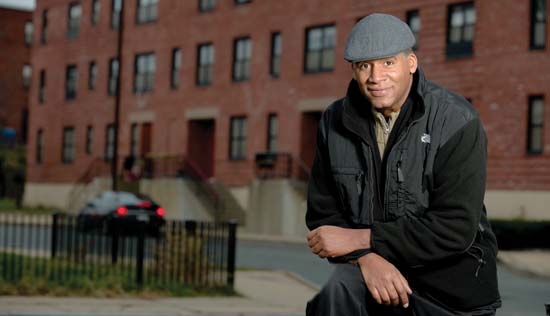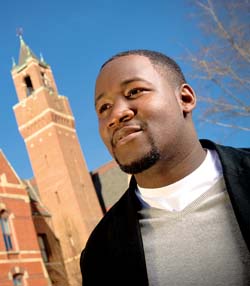 |
 |
| current issue |  |
past issues |  |
send a letter/news |  |
address update |  |
advertise |  |
about us |  |
alumni home |
Features
|
Project RISE slideshow |
UNH basketball legend Robin Dixon '83 helps at-risk kids change their game plan—before it's too late.
By Suki Casanave '86G
Also see: A video from Project RISE
Rob Dixon '83 had a hard time getting his bearings after the shooting. He was 11 years old, and the guys who showed up that afternoon in his Dorchester, Mass., neighborhood came to his house first. When no one answered the door, they went across the street and found his best friend, George. Their plan was simple: they'd steal some cash from the local convenience store; George, the youngest, would be the lookout. Then they'd all share in the take. The robbery was over in a flash. The older boys had already run off with the money by the time the owner came after them with his gun. When he fired, only George was still within range.
For a long time, Dixon was haunted by the fact that it could have been him, that he was alive but his friend wasn't. "We were Mutt and Jeff," he says. "We did everything together. But we got in with the wrong crowd." Disruptive and disrespectful at school, Dixon had a simple goal—to be cool. Which meant figuring out who he was going to beat up each day, and how he could make his teachers miserable. "I was a gangster," says Dixon, who credits his mother, the spiritual center of their large family, and his father, an avid reader despite having only finished the fourth grade, with helping him find his way. "My parents were hardworking people who managed to raise 13 kids," he says. "They told me I'd better use my life to do something for George."
 Lisa Nugent/UNH Photographic Services
Lisa Nugent/UNH Photographic Services |
Today, Dixon helps save the lives, both literally and figuratively, of hundreds of at-risk kids through Project RISE (Respect, Integrity and Success through Education). "I started this program as an answer to gang violence in my own community," says Dixon, who lives in Brockton, not far from the strife-ridden neighborhood where he grew up. Every child who makes it through Project RISE and moves on to a productive life is another blow to the forces that struck down his friend so many years ago. Every success story is a tribute to George.
DIXON'S OWN PATH to a better life began almost by accident when a friend got him to fill out an application for private high school. "It gave me an excuse to skip math class," he says, chuckling. The last thing he expected was to get in. But a few months later, an acceptance letter appeared in the mail. And in September, when he stepped off the bus for the first time in front of his new school's ivy-covered brick buildings, Dixon thought he was in the wrong place. Thayer Academy in Braintree, Mass., was only a few miles away from his inner-city school, but it might as well have been in a foreign country. "I was completely overwhelmed and unprepared," says Dixon, who was one of only four African-Americans on campus. He struggled to fit in both academically and socially.
 Lisa Nugent/UNH Photographic Services
Lisa Nugent/UNH Photographic ServicesProject RISE helped Napoleon Lherisson, who was several years behind his grade level, make up for lost time. Today the recent Brandeis graduate is a history teacher. |
But by the time he was offered a basketball scholarship to UNH, Dixon had adjusted to his new life and become a diligent student and successful athlete. At UNH, he made new friends, majored in history, minored in economics—and set fire to the basketball program. "Rob helped bring the team to an all-time high in the early '80s," says Scott Weitzell, director of operations for UNH basketball. "He and Al McClain '84 were two of the greatest guards who ever played at UNH." The two friends remain the top scorers in Wildcat history.
After graduation, Dixon was drafted to play with the Washington Bullets, and then, when he was cut from the roster before the season began, played professional basketball in Europe for two years before returning to Boston to spend more time with his young family. He took a job as a substitute teacher during the day, but nights found him back on the basketball court, this time as an assistant coach at Boston University, where he worked alongside Bill Herrion, who now coaches the UNH team. In 1989, Dixon took a job at his high school alma mater, teaching history and coaching basketball.
Much as he loved being a professional athlete and a college and high school coach, Dixon always viewed basketball as a stepping-stone to something else. "It helped open doors for me," he acknowledges, "but what I really wanted was to give others a chance at the same education I was able to have." Teaching at Thayer was a start, but Dixon wasn't reaching the kids he most wanted to help—the ones, he says, "who looked like me" and were floundering in troubled communities.
Page: 1 2 3 4 Next >
Easy to print version
blog comments powered by Disqus
